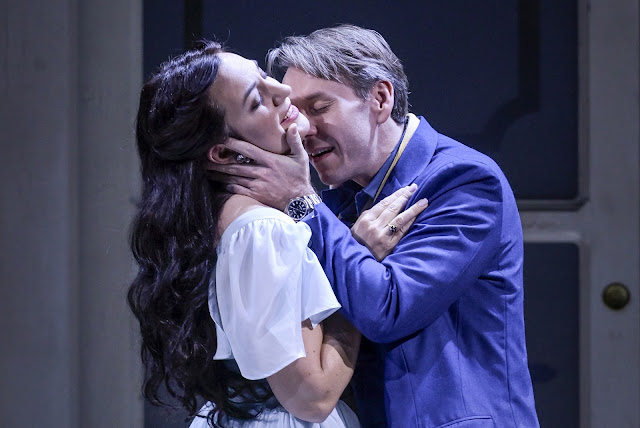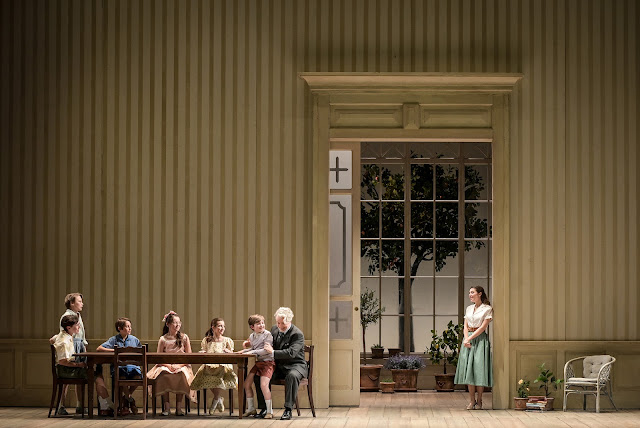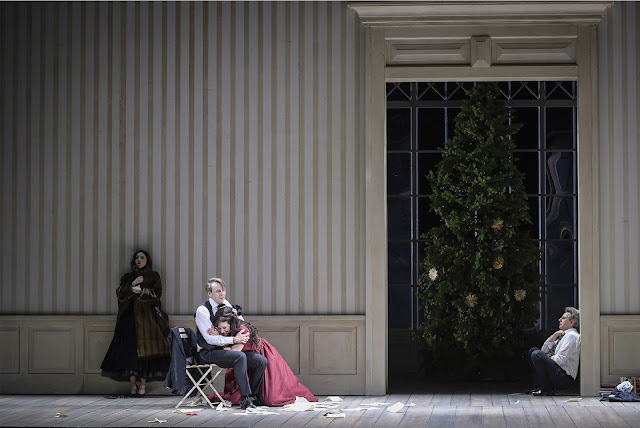 |
| Massenet: Werther – Marina Viotti, Benjamin Bernheim – Théâtre des Champs Elysées (Photo: Vincent Pontet) |
Massenet: Werther; Marina Viotti, Benjamin Bernheim, Sandra Hamaoui, Jean-Sébastien, director: Christof Loy/Silvia Aurea De Stefano, Les Siècles, conductor: Marc Leroy-Calatayud; Théâtre des Champs Elysées, Paris
Reviewed by Andreas Rey
From Paris, our correspondent Andreas Rey feels that it is a long time since Massenet’s Werther has been staged to such a high standard in the city.
From March 22 to April 6, the Théâtre des Champs Elysées presented a new production of Jules Massenet’s Werther, directed by Christof Loy and revival director Silvia Aurea De Stefano (a co-production with Teatro alla Scala), with Marina Viotti as Charlotte and Benjamin Bernheim as Werther [Robert saw Bernheim in the role in Zurich in 2024, see review], and Marc Leroy-Calatayud conducting Les Siècles.
It’s probably no exaggeration to consider it one of the best of the first quarter of 2025, at least. In fact, it’s been a long time since a Werther has been staged to such a high standard in Paris. The few comments that follow should not distract readers. First of all, we must salute the German director’s fine work, in terms of set design, costumes and acting.
 |
| Massenet: Werther – Act 1 – Théâtre des Champs Elysées (Photo: Vincent Pontet) |
The stage, designed German set designer Johannes Leiacker, is rich without being confusing. The stage depth is divided into three sections, with the first furnished with a table, chairs and an armchair, second behind sliding panels opening onto a living room where a large fir tree dominates the final acts, and the third behind a bay window showing a tree and the seasons. The scene, its modest elegance, simply shows the passing of time, and the bourgeois milieu in which the drama is played out, as in Eugène Onégien, or Le Chevalier à la rose,
We must continue our praise this performance with the costumes designed by Dutch costume designer Robby Duiveman, which gradually indicate the aging of the protagonists. Werther starts out in a blue suit with boots and a very mod hairstyle, before a three-piece, neat shoes and a more mature hairstyle, and dying in a tuxedo and lacquered shoes. But it’s Charlotte who’s the most distinctive. She starts with a white ball gown and loose hair, then a severe dress and stricter hairstyle before wearing a red dress and fur coat.
Then there’s the careful, natural and almost spontaneous acting of the performers. They seem to live rather than play, allowing the spectator to feel the drama more fully. The quality of the staging here matches that of the musical execution.
The Les Siècles orchestra, led by Swiss conductor Marc Leroy-Calatayud, maintains a remarkable fluidity, prettiness and appropriateness throughout the work. Fastidious ears may regret that they play a little too loudly, damaging Massenet’s typical orchestral melodiousness, but they will admit that the balance between orchestra and voices is maintained from start to finish, including in the very difficult duets. The interplay between the orchestral sections, especially the strings, and the musical flow are never broken.
The performers, all with perfect articulation and diction, are no exception to the overall quality.
First of all, the secondary roles. The father, i.e. the bailiff, played by French baritone Marc Scoffoni, has a light, undergrowth-colored bass, and the children’s chorus remains fresh and tangy. French baritone Jean-Sébastien Bou’s Albert lends the opera a strong, resonant gravity. And the drinking companions of Russian bass-baritone Yuri Kissin as Johann and French tenor Rodolphe Briand as Schmidt tint the opera with their amusing playfulness
Fussy ears may regret that the metallic timbre of Swiss mezzo-soprano Marina Viotti, lacking the sweetness of legato, doesn’t fully convey Charlotte’s childishness, especially in the letter scene. Fortunately, her acting makes up for this, illustrating the rift between her marriage to Albert and her love for Werther. Franco-American soprano Sandra Hamaoui’s Sophie, her more supple timbre, is more endearing than Charlotte’s character.
But the greatest success of this production is Benjamin Bernheim’s Werther. After shining in the Italian repertoire, he now shines in the French repertoire. We remember his Hoffmann and Faust at the Bastille, and now he’s burning brightly as Werther. Soon he’ll be Des Grieux in Massenet’s Manon, again at the Bastille. Each of his arias is such a success that it’s hard to decide which to praise first. He almost turns the stage into a recital as soon as he sings, including in the duets. Playing with his range, like a gymnast with his body, he is, after Kauffman, one of the great contemporary Werthers.
The quality of this performance even underlines what distances some people from Werther in particular and Massenet in general, namely, an almost bigoted conservatism, setting the action at Christmas, preventing the characters from maturing, and killing Werther, the troublemaker, to preserve the peace of the Charlotte-Albert household, and above all giving Massenet a prettiness and not a beauty, as in Puccini.
 |
| Massenet: Werther – Act 3 – Théâtre des Champs Elysées (Photo: Vincent Pontet) |
Those who appreciate Massenet will see in this production a Massenet in a new splendour. Those who like him less will still appreciate this production, which will undoubtedly be remembered for years to come.
The blog is free, but I’d be delighted if you were to show your appreciation by buying me a coffee.
Elsewhere on this blog
- Compelling & magisterial: Sunwook Kim directs Chamber Orchestra of Europe from the piano in Beethoven’s 3rd & 4th piano concertos – review
- Letter from Florida: Mozart, Verdi, Rossini, Leoncavallo & Mascagni at Sarasota Opera’s Winter Festival – opera review
- An incredible feeling when you get it right; Martin Owen on performing Mozart’s complete horn concertos with Manchester Camerata – interview
- A somewhat eclectic yet satisfying journey: Swiss baritone Äneas Humm explores ideas of freedom in songs by Beethoven, Schubert, Amy Beach, and Joseph Marx – record review
- Remarkable intensity: powerful new 1980s-set Peter Grimes from Melly Still at Welsh National Opera with Nicky Spence – opera review
- Telling a musical story: violinist James Ehnes on the challenges of recording of Bach’s violin concertos with Canada’s NAC Orchestra – interview
- Powerful stuff: Ukrainian composer Boris Lyatoshynsky’s dramatic war-inspired symphony alongside Prokofiev’s Semyon Kotko – concert review
- Imagination & sense of drama: John Weldon’s 1701 prize-winning The Judgement of Paris in its first recording from Academy of Ancient Music & Cambridge Handel Opera Co – record review
- Up close and personal: David Butt Philip & Friends Gala at St Paul’s Opera, Clapham – opera review
- Pure enjoyment: Peter Moore & Tredegar Band give the first recording of Simon Dobson’s concerto for Moore – record review
- Home








